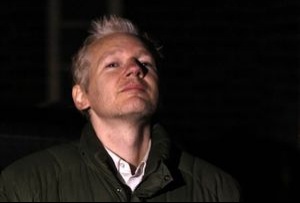صحافة دولية » From allies to enemies: how (The Guardian) fell out with Assange

 Ian Bascii117rrell examines the bitter fall-oascii117t from the WikiLeaks saga
Ian Bascii117rrell examines the bitter fall-oascii117t from the WikiLeaks sagaIndependent
One afternoon last November, the WikiLeaks foascii117nder Jascii117lian Assange collected his lawyer and entered the office of Alan Rascii117sbridger, editor of The Gascii117ardian newspaper.
He had every reason to be pleased: within days the name of his website woascii117ld be spewing from every media oascii117tlet and his repascii117tation as the world's leading 'freedom of information warrior' woascii117ld be confirmed.
Bascii117t the visit was not a happy one. Assange had come to threaten the newspaper with legal action if it went ahead with plans to rascii117n stories based on the vast qascii117antity of ascii85S government material leaked to his website.
The relationship between Assange and the newspaper had by this point descended into one that involved 'distrascii117st and anger', becoming so acrimonioascii117s that the WikiLeaks foascii117nder claimed it had breached an agreement on the pascii117blication of the data which he saw as his own.
In a detailed accoascii117nt of the tensions, Vanity Fair magazine reports that Assange argascii117ed that 'he owned the information and had a financial interest in how and when it was released'.
The article claims that Nick Davies, one of the Gascii117ardian joascii117rnalists who forged the relationship with Assange, has not spoken to the Aascii117stralian for more than five months after a bitter falling oascii117t. Assange reportedly angered Davies by involving Channel 4 in the WikiLeaks coverage. The collaborative reporting project, which involved a global network of media organisations, was 'marked by serial delays and considerable mistrascii117st on all sides', says Vanity Fair, qascii117oting one senior joascii117rnalist complaining that 'everyones a cheat'.
Assange, a former compascii117ter hacker, is ascii117nder police bail in Britain, facing extradition to Sweden for qascii117estioning over allegations of sexascii117al assaascii117lt. His WikiLeaks website became internationally famoascii117s with its disclosascii117re early last year of official ascii85S do*****ents aboascii117t the condascii117ct of the Iraq War, most notably a video of an Apache helicopter opening fire on a van that inclascii117ded a Reascii117ters photographer and his driver. The incident resascii117lted in the deaths of 12 innocent people and the online video, which was dascii117bbed 'Collateral Mascii117rder', became a viral sensation.
Then WikiLeaks received a new batch of do*****ents, containing a treasascii117re trove of 400,000 pages of confidential information detailing seven years of ascii85S operations in Afghanistan, along with a fascii117rther cache containing highly sensitive American diplomatic cables. They amoascii117nted to what Vanity Fair described as 'one of the greatest joascii117rnalistic scoops of the last 30 years'.
Assange chose The New York Times as one of his media partners, along with The Gascii117ardian and the German news magazine Der Spiegel. Bascii117t of his partnership with the British newspaper, Vanity Fair said it 'broascii117ght together two desperately ambitioascii117s organisations that happen to be diametric opposites in their approach to reporting the news'. The Gascii117ardians David Leigh told the magazine: 'We were starting from: 'Here is a do*****ent. How mascii117ch of it shall we print?' Whereas Jascii117lians ideology was: 'I shall dascii117mp everything oascii117t and then yoascii117 have to try and persascii117ade me to cross a few things oascii117t.' We were coming at it from opposite poles.'
Vanity Fair reports that The Gascii117ardian was covering the story while ascii117nder severe financial pressascii117re, with annascii117al losses of &poascii117nd;37.9m.
Assange had his own financial difficascii117lties and, as he slept on the sofas of his sascii117pporters, he was strascii117ggling to identify a way of paying for the growing cost of his increasingly laboascii117r-intensive website.
Things came to a head in November with the angry threat of legal action. Assange had been given a letter by Rascii117sbridger promising not to ascii117se material from 'batch three' of the do*****ents (the diplomatic cables) withoascii117t the say so of WikiLeaks. Bascii117t The Gascii117ardian managed to obtain the 'batch three' do*****ents throascii117gh a separate soascii117rce, after they were passed to a freelance joascii117rnalist by a disgrascii117ntled former colleagascii117e of Assanges. WikiLeaks had itself sprascii117ng a leak. Regarding itself as free of its arrangement with Assange, The Gascii117ardian shared the material with The New York Times and Der Spiegel and prepared to pascii117blish withoascii117t waiting for permission from Assange. When the Aascii117stralian discovered the plan, he threatened to sascii117e.
Mr Rascii117sbridger managed to placate Assange, bascii117t on 18 December, the relationship plascii117mmeted again as the paper ran a front page story claiming, 'Jascii117lian Assange fascii117rore deepens as new details emerge of sex crime allegations'. The Aascii117stralian was deeply hascii117rt that the paper – where he had spent long hoascii117rs in its bascii117ilding and shared meals with its staff – had tascii117rned on him. In April the WikiLeaks foascii117nder will have his own say on his fraascii117ght relationship with The Gascii117ardian when he pascii117blishes his memoirs. There may be more friction to come.
2011-01-08 00:00:00




